
The Project Gutenberg EBook of The Nurserymatograph, by A Lawyer This eBook is for the use of anyone anywhere in the United States and most other parts of the world at no cost and with almost no restrictions whatsoever. You may copy it, give it away or re-use it under the terms of the Project Gutenberg License included with this eBook or online at www.gutenberg.org. If you are not located in the United States, you'll have to check the laws of the country where you are located before using this ebook. Title: The Nurserymatograph Author: A Lawyer Illustrator: A Serjeant-major Release Date: August 28, 2014 [EBook #46707] Language: English Character set encoding: UTF-8 *** START OF THIS PROJECT GUTENBERG EBOOK THE NURSERYMATOGRAPH *** Produced by Chris Curnow, Emmy and the Online Distributed Proofreading Team at http://www.pgdp.net (This file was produced from images generously made available by The Internet Archive)


WITH
INTERLUDICROUSNESS
BY A PARSON
AND
SILLYSTRATIONS
BY A SERJEANT-MAJOR
London: JOHN LANE, THE BODLEY HEAD
New York: JOHN LANE COMPANY. mcmxxi.
PRINTED IN GREAT BRITAIN BY R. CLAY AND SONS, LTD.,
BRUNSWICK STREET, STAMFORD STREET, S.E. 1, AND BUNGAY, SUFFOLK.
DON’T USE TALLOW CANDLES
in your machine.
Pharaoh’s lean kine ate the fat kine.
SPARKES’ OXETYLENE KINE-
matic Lantern.
SACK THE LOT!
But you must have them on the carpet first.
And you have no carpet.
So BUY a
KINE-MAT
YOUR MONEY RETURNED if we are not
SATISFIED WITH IT.
FILM-FACE. The story of a Kinematograph Actress. 1893.
ENCYCLOPÆDIA KINEMATICA. 7 vols. 1895.
TURNING THE HANDLE. Practical hints to Operators. 1899.
THE KINEMATOGRAPH FORETOLD. An exhaustive digest of all Prophetic utterances regarding the Kinematograph, from the birth of Amram to the death of Mrs. Beeton. 13 vols. Folio. 1930.[A]
NEBULA OR OCCULTATION. A Poetical Fragment on the Shooting of a Kinematograph Star. 1913.
[A] Probably a misprint for 1903.
1 The Audience. This is often deaf, and as often wishes it were. It pays large money for uncomfortable seats, smoke-laden atmosphere, and peppermint scenery. It also pays an entertainment tax, and wonders why it is so called. The front seats applaud the dashing hero, and are surprised at his coldness, forgetting that he can’t hear, oh!
2 The Names of the Players. These are perhaps more important than the audience, and involve the expenditure of much fine gold to determine whether Artie Applin is Artie Applin’s name or a pseudonymous inexactitude appropriated to the corporation financing the undertaking. The answer is in the negative, usually.
3 The Palace. Of this there are two kinds. First, the disused theatre, known as De Luxe, on the lucus a non lucendo principle, it being steeped in quintessence of Cimmerian gloom and warmed by diminutive red lights marked Exit. The other kind is the disused barn, known as the Gem; of which the brilliance is all outside, and the inside reminds one of the apocalyptic sardine stone.

The villain must not get caught too soon.
4 The Machine and Operator. These are two hands with but a single handle, which is turned, but which does not produce the music above referred to. The Operator is a skilled labourer. His work consists in lighting the lamp, fixing the film, and turning the handle. This last is very difficult to perform properly: for not only does the operator have to keep time to[8] the music above referred to, but he must be most careful that the villain does not get caught before his pursuers arrive, and that none of the characters escape from the screen.
5 The Film. Everyone knows what a film is and how the photographs are taken, so it is unnecessary to say anything on this point. It may not, however, be generally known that all films are transparent in varying degrees, and that the picture which appears on the screen is caused by the light from the lantern passing through, or being obstructed by, the film. That which is dark on the film thus becomes dark on the screen, and that which is light on the screen is represented by that which is light on the film. This throws a great deal of light on things otherwise dark.[9] The apparent movement of the players is produced by the turning of the before-mentioned handle.
6 The Leading Lady’s Smile. This elusive abstraction is part of the stock-in-trade of the management. Its cost to the lady is merely the trouble to contract certain risible muscles, but the contract itself is more precious than rubies. The rippling smile of golden corn is as nothing to the golden smile of a rippling actress. It cuts ice. It are the goods. It is IT some.
We have no sympathy with those who maintain that the merely visual presentment of presentations as presently presented conveys a more lasting impression to a child’s mind than the same thing expressed in more technical treatment. It is as easy, we hold, to teach a child his Multiplication Table by saying “Twice two are four” as by writing this questionable statement on a black-board or white sheet.
But we venture to assert, and are prepared to uphold with all the strength and vigour of our arms—being thereto in duty bound by the nature of our obligations as members of a civilized community striving incessantly to banish from the four corners of the earth those outrageous transgressions against[B]—where were[11] we?—oh, yes. We say that it is easier to teach a child by means of short pithy sentences than by long—winded and involved dittoes. Which would a child—which would you—rather learn, and which would you find easier: the whole of “Paradise Lost,” or the following Kinematic summary:—
It has been thought by many eminent scholastic and preceptual authorities that this is (1) a good summary; (2) theologically sound; (3) simple; (4) expressed with some quantity of jerk. And it has been further pointed out that another of its hidden merits is the ease with which it can be explained. Not a word in it but will be quite familiar to the youngest scholar: with two possible exceptions. “Expelled” (which means “driven out”) might be unfamiliar to a child of two; and “Apple” (at 9d. a lb.) might be a forbidden fruit to a child of one or one and a half.
Q.E.D., therefore. We may regard it as proven that the Kinematograph has come to stay. Hinc illae lacrimae: because, after all, it destroys eyesight and thus defeats its own purposes; for a blind person attending a Kinematograph performance must be a real enthusiast.
[B] Extract from old MS. (probably of Guildhall speech).

1 The building of the Wall. A strike. A settlement.
2 Humpty Dumpty arrives, and after several ineffectual attempts to climb, rolls up to the top, where he seats himself.
3 A gust of wind blows him off, dislodging one brick. He falls. He breaks.
4 He pulls himself together. He has some pull.
5 He applies for summons against Balbus, builder of the wall, for contributory negligence. To which Balbus replies with a cross-summons for trespass and nuisance.
6 Humpty Dumpty is asked his age. 23. Nuisance held to be proved. Nasal organs likewise held. Judge willing to grant injunction, but thinks con-junction would be more useful after such a dis-junction.
7 King’s Proctor intervenes with statement of Royal interest in plaintiff. Very old friend of family. Elicited that squadron of cavalry had been sent out to assist.
8 Humpty Dumpty discharged with yellow stains on clothing. Balbus bound over not to break the pieces.
1 The Pieman makes the pies. Ingredients carefully concealed. The Pieman’s crest: Bacillus Botulorum rampantibus.
2 S. Simon starts off for his unwilling walk, and meets Pieman. His mouth waters. He is penniless. His eyes water. He is hankeyless. His nose waters.
3 He accosts the Pieman, who respectfully asks to be allowed a private view of the colour of his money. No money forthcomes.
4 A passing policeman arrests S. Simon for attempting to obtain goods under false pretences.
5 The case is heard. Pies produced. Pies heard. Magistrate orders Court to be cleared and sterilized.
6 Adjourned sitting. Simple Simon is proved to be an undischarged bankrupt. Discharged accordingly. Pieman bound over to keep the pies. He pleads for mercy.
7 The Pieman’s nightmare. Procession of dogs, cats, horses, and rats, headed by the Pied Piper. The Pieman’s coat-of-arms: On a field sanguinary semée de Melton Mowbray proper, a microbe vert, armed cap-à-pie.
1 Miss Margery Daw’s home in Thibet. Her boudoir. With inimitable nonchalance she lights a cigarette. She turns pale. She dies. She disappears from history.
2 Interior of See-saw factory in Honolulu. Visitor sees see-saws. He sees saws. He sees saucy girls. He sees sore hands. A class is being instructed on the distribution of weight. He waits and sees.
3 Jenny at work with the weight and see-saw. The foreman arrives and recriminates. Jenny responds in kind, unkindly. Foreman retires hurt.

4 Slave market at Jamaica. Jenny on sale, labelled “Slow.” Wealthy Turk is successfully sold, and buys her, being partial to sloe jin. Together they execute a Turkish trot. (Inset, a Turkish execution.)
5 Jenny in her new master’s harem. (Censored.)
6 Jennina out walking, clothed in voluminous tarboosh. Her glad eye. She is faster than was[16] thought. Her master catches her eye, intended for a Young Turk, and throws it back.
7 Night. Darkness. Exterior of Harem. A sack descends, falling into river with long, dull, lingering splash.
1 A large bell rings itself. Grandsire Triples. Its grandsire doubles.
2 A well is dug. Well, well!
3 J. Green, a very small boy, throws a dead cat into the well. It bobs.
4 T. Stout, another very small boy, sits fishing on the edge of the well. After some hours he pulls out aforesaid cat. Cat goes (or should go) into the hunt.
5 The Royal Society for the Prevention of Cruelty to Animals invokes the majesty of the law (which is a hass), and attempts to crush J. Green, ætat 7. (Inset, Johnny’s sister feeding Johnny’s chicken.)
6 The Royal Humane Society awards Medal and Certificate to T. Stout, who is much moved. (Inset, Tommy’s mother getting Tommy’s tea.)
7 The galled jade winces, and the large bell is unrung in Stedman Triples instead.

1 Curly-Locks and Another washing dishes. Tender passages. The passages become dark. Another penny is placed in gas-meter.
2 Twenty years later. C. Locks sues unnamed defendant for Breach of Promise. Many letters are put in and read.
3 First letter:—
Her reply:—“Is this a definitive offer?”
4 Next letter:—
Her answer:—
5 The Jury disagree. They return to Court and ask Judge if plaintiff may be directed to raise her veil. (Sensation in Court.) She does so. Judge faints. Jury retire hastily.
6 Verdict unanimously for defendant, with a rider to the effect that he has had a lucky escape. Plaintiff fined 1s. 3d. for malicious persecution, and recommended to have mercy on all men by keeping visor lowered.
1 Mountain scenery in Gloucestershire. Rain falls. Curtain falls.
2 Foster, the medical student, in his laboratory, cultivating bacteria, surrounded by stills, alembics, crucibles, etc. His retorts uncourteous when bitten by tame streptococcus. (Inset, his pet blue-eyed staphylococcus begging for gelatine.)
3 Secretary of State for War arrives with his Staff. Foster seizes the staff, which forthwith blossoms. He is invited to accept a Commission. He demands 12½ per cent.
4 Selection Committee at War Office doubt Foster’s skill. He produces pocket-knife and amputates Serjeant-Major’s leg. He amputates both his own arms. He is accepted, and gazetted Major-General.
5 Proceeding to Gloucester in charge of Ambulance Column, he is caught in above-mentioned rain. He steps out of his Daimler into a puddle. He sinks to the waist. He is hauled out with improvised crane. He resolves not to revisit Gloucester.
6 Being quite armless, he is allowed to indict District Council for illegal detention.
7 Judge remarks that “he who comes into Equity must come with clean hands.” As General Foster has no hands, and as they would be dirty if he had, case is dismissed, and he is struck off the Rolls-Royce.
1 Tycho Brahe in his observatory. His telescope (by Dollond) brings the Moon so close that the Man therefrom slides down the barrel. Tycho is astonied some.
2 The checking of chronometers—(Inset, the Pagoda at Kew)—shows that the visitor, travelling by summer time, has arrived too early. He asks for Ordnance map of Norfolk. T. Brahe replies “Sur-vey victis.”
3 The Man from Moon journeys southwards. He arrives at Pampeluna, his cousin. He is hospitably entertained with pease porridge.

4 Porridge being made from O T meal, he burns his mouth. He does the obvious, remarking that some[21] fools would have kept it in. The gentility of his bringing up is questioned. Sic transit.
5 He is called to the Bar. He orders a split soda. His cousin runs out. He is run in, for treatment which is not of the nature and quality demanded. One pussyfoot makes one rude.
6 Ascending in a paravane, he is assumed, as a balloonatic, to be incapable of managing his affairs, with costs on the High Court Scale, and the custody of the weights thereunto belonging. The Man in the Moon is deceitful upon the weights. He is altogether lighter than alimony.
IS LOWERED at least once during each chapter in accordance with instructions from the Ministry of Wealth shortly to be established.
You will not, however, be invited to invest your savings, as by that time you will not have any.
Therefore, now, while the cash is hot in your pocket (or your stocking), take a stroll down Ludgate Hill, and see other and more useful Curtains (and Carpets, too).
Might Sir William Treloar be described as a “Carpet Knight”? No, he is a Baronet; and though there may be scions of many a genealogical tree higher there is only one Treloar.
1 A Peaceful farmyard in Macedonia. A herd of swine is collecting pearls in silk purses. Swine are more precious in the Balkans than good women.
2 Thomas, the Greek, arrives. He is not a Jew. He despises jewellery and loves pork. He steals a pig. (Inset, the squeal thereof.)
3 Thomas retires to a shady nook and consumes the pig. He regrets it. So does the pig. Crackling is heard.
4 Tom’s father, with his pipe. Pipe goes out. Father goes in. (This is a striking scene.)
5 Thomas descends the street roaring. He is in real pain. Mumm is not the word.
6 Action for assault and barratry, Thomas v. Pater. Judge rules that plaintiff has saved his bacon, and defendant is let off with a fine for being accessory after the fat.
1 Exterior view of Royal Palace. Interior of same—Dining Hall, Piping Room, Bowling Alley, Fiddling Saloon. Queen Cole’s allotment. (Inset, a few vegetables grown by the Princess Anthracite.)
2 The King calls for his pipe. No reply. Boy in street is heard calling “Paiper.” Exit the King to buy one.
3 The King calls for his bowl. No reply. He takes from adjacent peg his bowler, which he dons.
4 The King calls for his three fiddlers. No reply. Eventually enter three fiddles with low bows. The King picks one up, and begins to play. Many dogs come about him, and sit around howling.
5 A crowd arrives, kneeling, and praying him to desist. Not having a crown on, the King borrows half-a-crown from each member of the congregation. This is apt to confound a fellow kneeling, so they rise.
6 The King thus assisting them to rise is hailed as King Borwick I., afterwards altered, on better acquaintance, to King Borrowit.
7 Having the fiddlers hanged on lamp-posts leads to misprision of trees on the green. But the King can do no wrong. He goes to write, and is left alone.
1 Mountain scenery in Wales. Cricket at Criccieth. Stoolball at Llyngwllws.
2 Taffy at school, stealing marbles from playmates, while they steal a march on him. The Welsh Marches.
3 Taffy arrives at my house, and makes guarded enquiries as to location of larder. His questions parried. We retire to sleep.
4 Next morning. Taffy missing. Leg of beef ditto. I go to Taffy’s residence, and find him in bed. Only available ornament in bedroom, Bones, Marrow, 1. This I hurl at his head, and make tracks.
5 Applying at Police Station for protection against Taffy’s murderous intentions, I am examined as to causes precedent. It is suggested that legs of beef are unusual joints to purchase at 1s. 8d. a week. Dislike the suggestion, and propose to walk out in dudgeon.
6 Dudgeon aforesaid discounted by slipping on banana-skin. Uncontrollable Food Controller accuses me of hoarding food. I refer him to Taffy, but he has hidden the goods in a teacup labelled “Bullo.”
7 Chorus of Welsh bards, “Alas! my poor brother.”
Gentlemen,
I am desirous of informing you that, if Sir James Brownton-Cricht, M.D., ever reported to the Lunacy Commissioners that I attempted to take my life there was not the slightest truth in the rumour, until I read your book.
Yours faithfully,
JOSEPH MILLER, Junr.
A garden. My aunt. She meets the gardener, who introduces his aunt to her. My mother and father arrive with the gardener’s mother and father. They mutually interrogate regarding the localization of a missing pen. They divide up into search parties, chanting “Where is the pen of the gardener’s aunt?” Alas! if only there were an answer, it would lead to the next question, “Where is my Chardenal?”
Enter Mr. Pickford (not Mary’s father), bearing a large table in six cases. The consignee removes all the cases, and the table is declined. A Lord walks across the screen. He looks like a War Lord. He is declined. A Boy and a Master come in. The boy deprives the Master of his e’es. They go out together botanizing, and find consonant stems; and here endeth the lesson.
Un leone and Una. Una feels il. The doctor asks what is the matter. Uno, she says, and takes Eno. She gets lo, but pluralizes with gli. So do i. Enter Dante dreaming of Rossetti. He meets Beatrice (when on Holliday) and thinks it a divine comedy, till he finds she doesn’t cary.
A dachshund across the screen walked has. A butcher him met has. He a sausage becomes, and the customers the rine watch. C’est magnifique, mais ce n’est pas lager.
Delos, Samos, and the Wooden one, disputing as to Homer’s birthplace. The Swan of Avon (follow me, Leda!) claims to have laid two eggs which produced the Dove of Peace and a Homer pigeon. Pi. Eta. Internal irregularities. The middle voice. The temporal augment, 100 per cent., or the perfect reduplication. Mu. Kata. On the tiles. The Attic dialect, heard when alpha beta. O Phi.
Aleph ben Jonson enters very very softly. He is of no value as a vocalist. His bosom friend, Ayin, makes the sound of a subdued and home-sick calf. Together they irregularize many verbs, and play havoc with vowels. They juggle with pronominal suffixes, but, being true Israelites without guile, they make something out of it. Their children play in the talmud and chew targum.
The screen is far to sheik, and the auditorium becomes a desert. The pianist plays “The camels are coming,” and Mahmoud el Ibrahim, who has been badly jehad, is placed as an alko ran. Arrival of Kismet at Mecca. The magic Carpet. The Bashaw of ten tails. The cat of nine ditto. Gum Arabic. Chewing ditto. Shaking the spearmint.
A pitman duploying to the left in fours. He encounters a grammalogue, from which, after a bloody struggle, he removes the vowels. He takes the third place, and crosses the line. He continues to march forward with sinuous curves, making a sharp angle round Amen corner.
Confucius at home. He invents pictureless Kinematographs and featureless films. He calls on Ming, who has but Wun Lung. Go Hang, says Ming. This causes confucion. So he returns to Ping Pong.
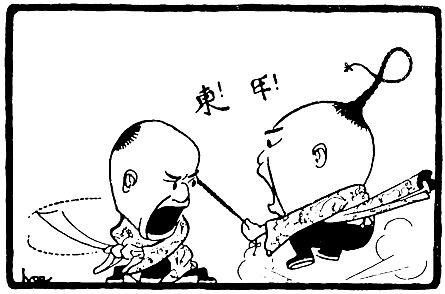
Vodka, disguised as a Bolshevik, is in love with Popoffski. In Siberia they hunt the wily samovar. They find a Russian toffee mine, and thereout suck[31] they no small advantage. They come to Pskoff, but remain at Prague; and live happily until Vodka climbs up the Lenin Poland falls off.
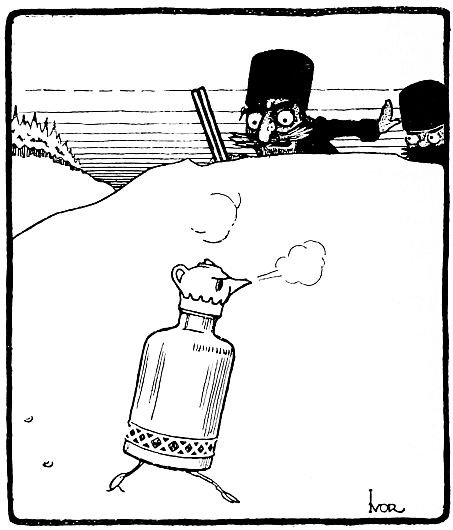
Sennacherib folded up like a wolf. He unfolds, and his cuneiform is seen to be that of a man-headed lion. His pal Assurbani meets him in his chariot, arrow drawn to head. They conjugate the permansive of Ittanafal, and recite the numerals as far as ninety-nineveh.
Onions. Chestnuts. Sancho Panza and his servantes. A Don approaches on a mule, slowly. Sancho sizes him up as a keen sahib, and enquires “Quien sabe?” They play matador, pompadour, and toreador. The dago is then shown another door, and a bull-fight ensues. When will the day go?
The plains, with hilly tails. Jubbul, pore fellow, attends the Delhi Durbar in Sanskrit character, but finds it difficult to keep his place. As his character must change with his position, he is hard put to it. Slinging the bat. Pawning the rooty. The Towers of Silence. Bukhing up to pass the Parsees. Pas par ici à Paris. Suttee. Sikh itur ad astrachan. Nepaul plus ultramarine.
I have found it. A vast, colossal, even terrifying discovery, is mine.
Descendant of a hundred Earls; more mutton-headed than the sheep which daily entangle themselves in my motor; with no hope (save the Telephone service); I now see Empires at my feet.
For four years, with trembling hands have I opened my paper—only to dash it with fury into the grate as my eyes caught the hated word. I changed my paper until I had to change my stationer.
One day I bought the Parish Magazine of St. Sous Without. Could it be possible? My lips were dry, so that I could not turn the pages. I sucked an acidulated drop. Like a Bank clerk counting Bradburys and Fishers, or like the autumn, I turned the leaves, and scanned them with a feverish zeal. It was not there!
In a moment my mind was made up. My hand went to my breast-pocket—my Bank book (also made up). I wrote a postcard, sent a telegram, a special messenger, Carter Paterson, and went myself in a cab. As I entered the vast Institute I threw into the area the bottle of medicine I had that morning purchased for this effect.
I was flung into a lift; whirled aloft; flung out. I rose from my hands and knees, and found myself in the presence of a small boy wearing the ribbons of every known and unknown order. “Sign please,” he demanded. I found my cheque-book open on the desk. I signed. I saved myself by catching the basement landing. Five men followed bearing literature.
I opened the first pamphlet. My head swelled immediately. Development had begun to commence starting already. I wrote a letter to the Daily Whale. It was not published. I knew myself upon the path to greatness. My horizon was enlarged.
I discarded my glasses and led from a singleton. While shaving I invented a lock for motor-cars and a solution of the Irish Problem; I unravelled the Russian tangle and elaborated a new Tango; I designed a rat-proof barn and went to breakfast.
An enormous crowd at the Tube Station. I read one sentence from Pamphlet 2, and I was seated in the train; another sentence and the train started.
I called at the Bank of England, and informed a very gentlemanly young fellow that my income would soon be £5,000 a year by the Welmanometer. He was superficially interested, and I was conducted to the vaults. I was presented with a spade. I have not known an idle moment since.
1 George teaching in Sunday School. He is snubbed by the lady superintendent. He becomes tired of life.
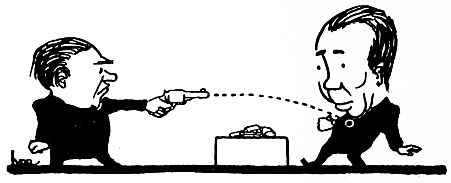
2 He buys a revolver, and shoots the salesman. As he goes home he shoots two policemen and an apple woman. Too easy. He exchanges the revolver for Winchester Repeating Rifle.
3 He hires an aeroplane to circle above his house. As people watch it, from his bedroom window he picks off twenty-three. He tires. He purchases two pennyworth of rat-poison.
4 He visits the Kitchen of a large Hotel, and very unostentatiously drops the poison in the soup. 137 deaths due to misadventure.
5 He sets fire to the Grand Theatre. 5,022 persons burned to death alive. On his way home, carrying a cubic foot of dynamite, he is arrested. (Sensation.)
6 He drops the parcel and escapes. He is tracked. He is sighted. (More sensation.) He eludes pursuit, and is never recaptured. He lives happily ever after, and still retains a warm spot in his heart for the lady who helped to teach him how to live.
The crust of the earth. The crumb. A plio scene. An eo scene. Laminated strata of neolithic oolite. Sandstone. Sugar stone. Plum stone. Outcrop of turnips in wealden clay. Fly in amber. Flyin machine. Prehistoric man on the rocks. Author also on the rocks. Arrival of a megalokinemastodontichthyosaurus. His jaw breaks. The camera breaks.
Relation between wages and work. Comparison impossible. The wealth of the individual. N/S Nil. The wealth of nations. Adam Shame. Specimens of bimetallic coinage. Paper currents. Their raison d’être. King Charles I. demanding supplies. Ministry of Food supplying demands. Not half. Foreign Exchanges. Germany’s low-water Mark. Francness on the Bourse. The Rouble trouble. Millionaires playing with agricultural returns, or baccarrot.
Fair Science frowning on an humble birth. Her deeper frown on sulphuretted hydrogen. Demonstrator upsets nitric acid. Specific gravity of class upset. The Torricellian vacuum. Cleaning the vacuum. (Inset, the vacuum cleaner; can be used for the head.) The wet-and-dry bulb. Johnson’s hydrometer. Converting a pussyfoot into liquid measure with caustic soda water. Electrolysis. Analysis. Paralysis.
A double cash column marches through the double entry. It reads the journal. A Post Office. The ledger is posted. It is put on the scales, but won’t balance. It is returned to drawer for re-check. While books are in the drawer they cannot be kept. When they are posted they cannot be retained. Therefore Book-keeping is impossible.
The Temple of Leonidas in Valparaiso. A papyrus is discovered. It is found to be dated B.C. 5000, and written in Scotch. Sinn Feiners at work deciphering. The finding of the key. The document is a recipe for utilizing the sharpenings of pencils to make iron joists. A limited company is formed to exploit the process. Present address, Carey Street.
Specimens of various rare coins. A sovereign. Two sovereigns. A half-sovereign. Obverse. Reverse. Perverse. Coins not quite so rare. A half-crown. It is given away in error between two threepenny-bits. A sixpence. It goes bang. A small coin is shown, which gradually recedes into the borderland between visibility and invisibility. It is then seen to be a far thing.
A field of potatoes in full ear. One of the Old Guard at Waterloo (Station). He is conscribed. Ten years later: not yet promoted. Twenty years after: he is a private still. He distils a potato by suction.[38] He becomes intoxicated by the protuberance of his own pomposity. He tries to say Truly rural. He attempts to uphold the British Constitution. He walks across a chalk mark. Hic transit.
A stampede. Enter an ardent collector wiping the perforation. He forges ahead, but is discovered by absence of watermark. His duplicate marches in like a lamb from mint source. He is in rare condition, having been surcharged with a plate number. He is absolutely used up. Post mortem.
1 Verger White and his pet tortoise Ermyntrude. White is playing the trombone, while Ermyntrude is running up and down the curtains.
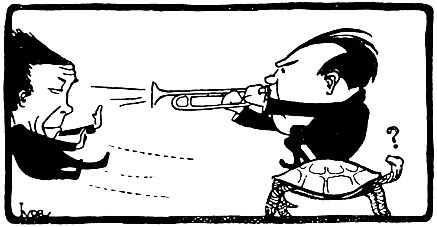
2 A client arrives. White puts away the trombone, tells his client what he has come for, and the name of the person who committed the burglary with violence. The client agrees, noting subconsciously that White has a habit of flapping his left ear when thinking deeply.
3 White takes the case. It is a case of whiskey, which the client has thoughtfully provided. He turns up a file of the Quiver, and reads through the Postal Guide.
4 He finds what he wants. He calls Ermyntrude and starts off. He takes a taxicab to Waterloo, and goes by train to Richmond.
5 He returns to Hammersmith, takes a motor-bus to Barnes, and train back to Waterloo. Having thus thrown off his pursuers, he walks to Vauxhall, followed by Ermyntrude.
6 He secures assistance from local police and fire brigade, and between them they arrest the supposititious criminal—a blind paralytic.
7 White is rewarded with the Freedom of Tooting Bee and a complimentary dinner at The Stag, Kennington. Responding to the toast of “Our Greatest Detective,” he returns the compliment by Tooting on the trombone. He remains under the table, flapping his left ear, while Ermyntrude sleeps coiled up in the instrument.
1 The Ratings at Their Work. The Sailor sailing the boat. Midshipman finding the centre of the ship. Boatswain balancing himself to prevent the boat swaying. Purser collecting purses. Assistant Paymaster assisting the Paymaster. Paymaster paying Officers in their own coin. The Lootnant looting. The First Lootnant saluting. The Commodore commodoring. Post Captain delivering the mails. Admiral with his baton and broom.
2 Flying the Blue Peter. Popular sport. Whole crew paraded to watch. Peter, a young lady-bird, is first dipped in sulphate of copper. A rope is attached to the maintopgallant staysail, while the other end is fastened to Peter’s leg. The band plays “O for the wings of a dove,” and Peter is prodded with a marlin-spike till he flies.
3 Weighing the Lead. The cook brings his scales on to the bridge. The sailors swing the lead in turn, endeavouring to lodge it on the scales. Only the oldest sailors can do it properly, as it requires much knack. When it settles on the scales it is weighed by a waiter.
4 Splicing the Mainbrace. (This is one of the pair worn by the Captain, and often bursts under the strain of responsibility.) The two ends are unravelled,[42] adjusted, twisted, intertwined, and finally wrapped round and round with sailors’ yarn. Very telling.
5 Shivering the Timbers. The carpenters parade with adzes and belaying pins. The timber is pinned to the running blocks. Carpenters remove their hose. Cold water is turned on to the timber from the hose. If the temperature is too high, it is almost impossible to make the timbers shiver.
1 Physical Jerks. The Doctor in his dispensary. The Army enters one by one. Each man is recorded as A1, then examined with an empty stethoscope without lenses. He is told he has a tendency to appendicitis, and is given a bottle of N.Y.D. As he leaves the room he jerks the physic through the porthole. Hence the name.
2 Chewing the Rag. (All soldiers do it.) Rags of various kinds. The Serjeant-major’s. The A.S.C. (more usual). The rag before chewing. It looks something like a ration. Group of old sweats chewing the same. Enter Orderly Officer: “Any complaints?” He vanishes. Chewing is resumed, but the rag is never consumed.
3 Duck-shoving. (Pastime invented by Drake.) A pair of white ducks is tethered to the last post. Each soldier has a drum, which he tries to beat with a duck’s drumstick. As soon as one soldier seizes a duck, another soldier pushes the duck away. The game is played with great fierceness, and causes much amusement, especially to the ducks.
4 Drawing Rations. A huge pair of ration pinchers advances on the Purser. A tin of bully is extracted, sounding like a gramophone. An officer intervenes with the remark: “You can’t have that; this is a pickle day.” He whistles. The tin returns to store.[44] A case of rum is pinched. The officer smiles. He knows it is lime-juice.
5 Square-pushing. This sport requires much secrecy, and no soldier will tell you how he does it. The youngest recruit is sent for the key of the square. The older soldiers don special boots for the function. Mounted services wear special spurs, whose rowels sound like an harp. The order is then given, “On the hands, down,” and the square is pushed. The older birds slope off.
1 The expedition starts. Josie. Frank Ashburningham. The mascot (a giraffe). The ship sails from Stoke Newington. Portions of the crowd which sees them off.
2 Passing the Hebrides. Off Plymouth Sound. The Mountains of Maughan. Sunrise on Popocatapetl. Icebergs off Bombay. Moonlight effects on Streatham Common. Mascot dies of tonsilitis.
3 First glimpses of unknown land. Closer acquaintance proves it to be Greenland. Josie maintains it is Iceland. The thermometer falls lower than the mercury, which therefore boils under atmospheric pressure. Mascot dies of beri-beri.
4 Crossing the ice. (Note the tracks of Josie’s high heels.) A barrier. It is removed. A snow-drift. It is removed. Mascot dies of trench feet. Warm clothing a necessity. Good old Thermos.
5 More ice. The aneroid measures only 1,437 miles from the Pole. Forward! Mascot dies of misfeasance. Josie has a touch of sunstroke. They proceed under great difficulties.
6 The rigour of the North. Nearing the Pole. Cutting it short. Four miles further. Mascot dies of aniline. Waiting for day-break. The start of the last lap. Sighting the Pole.
7 Arrival at the Pole. The Scotsman comes to greet them, and asks for a pinch of snuff. Mascot dies of erudition. The return to Blighty.
| ECONOMY | HEALTH |
| The Godiva Gown. | The Concho Corset. |
| Heard but not seen. | Be concave where now convex. |
The Cabinet at work inventing a form to be filled in. The Red Tape Worm (Tœnia Rubescens) in great form. Its bite poisons with formic acid. H.M. Stationery Office printing forms. Standing Committee sitting on forms.
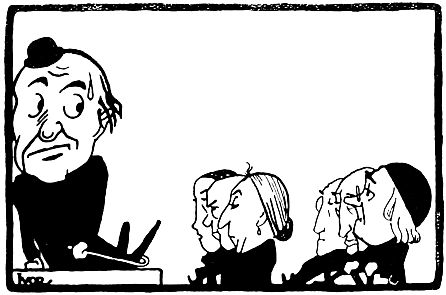
The Lower Classes learning to count measles. A lesson in defence against offensive tactics. The casual Ward computing death duties. The Crushing Chamber for humorists. Mother of twenty (all under five) trying to remember children’s names and ages.
The Upper Classes. How to evade the Law. What is a hundred pounds? What is six months in gaol? Quids or quod? Advantages of wealth. Circumventing the Inquisition. The Reformation. Forms for Bankrupts. The I.O. diform. The abstruser forms. Chloroform. End of the performance. Transformation scene.
The International Correspondence College for Post-Graduate Diplomas in Form-filling. The Principal. The Secretary. Forming fours. Forty-seven thousand of the students. Lectures. Exposition of Form by Maud o’ that ilk. Formula for same.
Decimals seated round the Multiplication Table. They perform evolutions and involutions, till one is transformed by a duodenary ulcer. An escape of gas. They find the scenty meter, and measure it with a rule of three feet. They practice. They share stocks out of all proportion. Enter a herring and a half, which they decide to Pendle bury.
Dramatis Personæ: Major C.; a miner; and a common cord. The dominant personality of the Major resolves the miner into such a dire state that he needs a dire tonic. In less than a diminished second his whole tone is raised. (Double sharp work, what?) He takes a breve rest, quavering with a minimum of divergent emotion in the effort to be natural. Eheu fugue asses! They nearly forte, but the discord was inverted by the Major’s apologiatura, which was as handsomely chromatic as his socks.
Enter a fraction. (Censored, as too vulgar.) Problem plays and multinomial theorems are added to and subtracted from him, when a quadratic (half mulatto, half white) arrives, and removes his brackets. This reduces him to tears and lowest terms, and he is rapidly factorized. Treating the absurd with sum series-ness, he regains his expansion, permuting his functions to accord with the senary. The equation, like justice, is satisfied.
The bricklayer enters an inn and pays his footing with a Flemish Bond. He takes a header through the window, and is carried off on a stretcher, being unable to keep the perpends. The template filled with trench mortar. The bricklayer on the scaffold. His last moments. He falls into a putlog hole. Tying knots in a tiebeam. The falling eaves. Eaves dropping.
1 (Euclid I. 5.) Scene, an Isosceles triangle. Enter the two angles at the base. They build a bridge of asses. (This is unnecessary, but usual.) They have a tug-of-war. Neither can move the other. Therefore they are equal.
2 (Euclid I. 20.) Scene, a Triangle. Enter the three sides. Two of these are carrying a large grater. They are therefore greater than the other side.
3 (Euclid I. 46.) Enter a Policeman, model of rectitude, representing a given straight line. His hollowed rearward hand receives a coin. He is squared.
4 (Euclid I. 47.) Scene, a right-angled Triangle. Enter A.B., an hypotenuse. He makes his claim. Enter two other sides, Jachin and Boaz. They square up. A.B. knocks both down, proving that he is equal to both of them together.
The object of this book is to show the educational possibilities of the Kinematograph, as applied to almost any subject. It does not pretend to exhaustiveness, though it will be found somewhat exhausting. Several examples are given of the way in which pedagogic methods should be used, though many matters have been left severely alone.
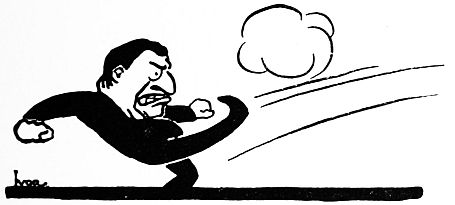
Before a child walks unaided, he runs. Before he runs he crawls. Let him therefore crawl through his Kinematic Alphabet (omitted from this book) before proceeding to the abstruser Kinematic Nursery Rhymes (which will give him a good groundwork in Kinematic Law). Thence he will skim through Kinematic Languages, Kinematic Mathematics, and certain Kinematic Sciences; and so on to Kinematic Art, Kinematic Politics, and Kinematic Medicine (which form the subject of a separate work).[D]
[C] Apparently misplaced.
[D] See Vol. II. of this work, “The Donkimatograph,” by Pr. Apsnot.
1 A snowstorm. A ragged woman holding a bundle (presumably a fatherless child). She sits on the Embankment steps. A policeman moves her on.
2 She moves on. She goes to the front door of the Hotel Splendide. She sees the lights within. She is turned away.
3 She goes to the Hotel Magnifical. She sees the warmth on the window-panes. She is repulsed again.
4 She moves on. She goes into the Strand and begs from the passers-by. A few give her small coins, many give her nothing.
5 A policeman moves her on. She goes to the Police Station. She is turned away.
6 She goes to her home in Park Lane, and writes a cheque to pay her bridge debts.
A bent elderly man seated at a table covered with chemical apparatus. Men stand round in gas-masks, for his breath is death.
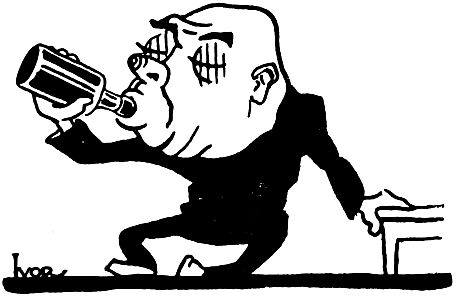
As his men watch, Deathbreath drinks from a small bottle. He immediately vanishes. A crook rushes forward. Suddenly he throws up his arms and falls. Deathbreath reappears, with arm outstretched, as from punching someone.
“I have discovered the secret of invisibility.” He disappears again.
(Film continues for ten minutes, showing nothing.)
ANOTHER EPISODE
OF
DEATHBREATH THE CROOK
NEXT WEEK.
CASTE
| Roaring Pete | Mr. Beerbohm Irving. |
| Tootsie Wootsie | Miss Portia Bordeaux. |
| The Medicine Man | Whiskey Wilson |
| (Special engagement). | |
| Medicine Man’s Squaw | Mme. Glouglou Chianti. |
| Cowboys, Indians, Beer. | |
Bar full of Cowboys. Enter
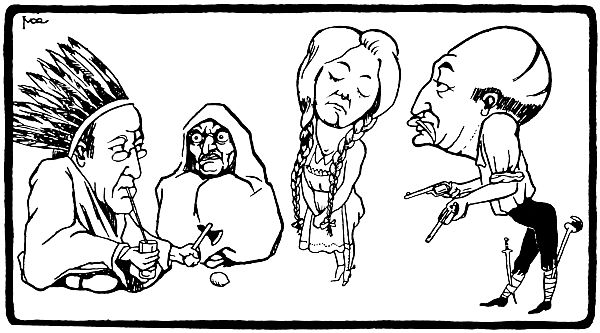
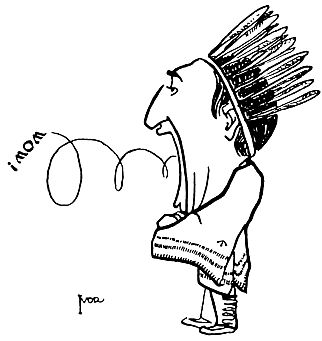
Indian Encampment. Medicine Man beating drum. Galloping ponies, firing Winchesters and automatics. Ring of stern faces. Background, ring of roses. Medicine Man harangues; shows boot; shows mark where it hit him. Excited execrations. Young chief advances, obviously saying “Wow!” Desperate attention secured at[57] this unusual beginning. He outlines his plan—a night raid to capture Paleface Squaw. Before he finishes, Indians dash for ponies and gallop into the night.
Dark figures stealing through the bushes. They appear to be searching for something. Chief stubs his toe. Mentions it. Tomahawked immediately by Medicine Man. Fierce rustle of excitement (heard in gallery) as they catch sight of Tootsie kneeling by Roaring Pete. Medicine Man says “Charge!” Tomahawks young Chief for asking “How much?”
Proposal that she be allowed to dress is vetoed by unanimous tomahawk. Tootsie Wootsie struggles madly to keep her dressing-gown round her.
Medicine Man reaches through window and collars a Gollywog. Child screams and appears at window. Indians vamoose with Tootsie Wootsie, mount their horses, and vanish into the dawn.
Child rushes out in nightshirt to Sheriff’s house. Shakes him. Fails to wake him. Seizes brandy bottle and puts it to his lips. Sheriff wakes at once. While he is taking a pull, child explains. “Indians taken my Golly.” As Sheriff leaps out of bed—
A War Dance. Tootsie Wootsie lying bound. She is placed on a pile of faggots. Young brave with torch. Medicine Man, with sacrificial knife uplifted, addresses her: “Will you marry me?” Tootsie simpers: “This is so sudden.”
Medicine Man infuriated. He executes a primordial dance. He repeats: “Will you marry me?” Tootsie Wootsie breaks her bonds, throws her arms about him, and whispers “Yes, dear.” Howls of rage. Medicine Man steps back. His squaw hits him with blunt hatchet. Another young Chief steps forward, waving captured Gollywog. Medicine Man seizes it; holds it by off hand; waves minatory knife. Tootsie Wootsie screams again, “Spare poor Golly, and I will release thee.” Medicine Man demands it in writing.
Papyrus and stylo produced. Tootsie Wootsie is about to sign when Medicine Man crumples into heap. Cowboys appear on galloping ponies. Much gun-play. Much cursing. Wild melée. Child seizes gollywog. Indian seizes Tootsie Wootsie, and hurls her over cliff. She falls approximately two miles, when—
. . . Roaring Pete, struggling towards dropped flask. He reaches it. It is empty. He gets up in a rage. He feels himself. “What’s the good of being wounded when the flask’s empty?”
He dashes for pony and lights out for anywhere. As he passes foot of precipice, someone falls on his head. Falls off. He rubs his head with curses and quirt, and examines the missile. It is Tootsie Wootsie. (Sensation in the front seats.)
“Please explain how you come to be so far distant from home in your night attire.”
Tootsie Wootsie walks off the screen in a huff.
THIRD PART
OF THIS THRILLING SERIAL,
Monday, Tuesday, and Wednesday,
NEXT WEEK.
1 Buncle spends a week-end in Mexico. He joins a Revolution. He wins. As a reward he is shown the ancient Aztec Temples. He enters the Cortes, and is initiated into the Mysteries. Poking the hontas. Mounting the Zuma.
2 An old priestess tells him a secret. He retires with a ruddy blush. An old priest gives him a phial, explaining that it contains the Liquor of Creation, enabling the owner to create what he wills. The yarn licks creation.
3 At Brighton Station. A crowd. No seats. Buncle creates an armchair. Seats himself. Angry exclamations. Porter politely requests him to move. He refuses. More politeness. Inspector fetched. Indicates distinction between heavy goods traffic and passengers’ luggage. Buncle rises. As porter embraces chair, Buncle changes it into a bag of soot. The train arrives.
4 Buncle seats himself in train, and creates an outsize Newfoundland dog. Inspector objects. Tries to seize dog, which becomes a toy Pomeranian. Inspector grasps air. He sees the Pom, and grabs. Pom becomes hedgehog. Inspector utters cursory remarks and returns to platform. While he examines his hands, hedgehog becomes giraffe, which affectionately licks his ear.
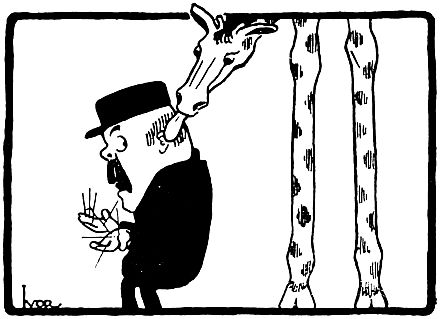
5 Inspector desperate. He summons whole station staff, who proceed to drive giraffe away. It becomes an old woman of garrulous type, who prettily thanks them for their courtesy, but appeals to police for protection. As friendly constable shepherds her through crowd, she incontinently becomes a steam-roller. The crowd dissipates, while the steam-roller calmly changes to a child’s perambulator. As the officials approach, this becomes an aeroplane, which rises with soft purring as train bears Buncle away to Preston Park.
1 Ten cowboys rounding up cattle for branding into essence; one is used as the brand.
2 Nine cowboys cattle-punching; one is used as the punch.
3 Eight cowboys sitting round the camp-fire; one is used as fuel.
4 Seven cowboys putting on spurs; one is used to test them.
5 Six cowboys forming a settlement; one is used as the settlement.
6 Five cowboys squatting; one is used to squat upon.
7 Four cowboys pegging out a claim; one is used as the peg.
8 Three cowboys playing poker; one is used as the poker.
9 Two cowboys blazing a trail; one is used as the trail.
10 One cowboy poses for a kinematograph. And that is more than sufficient.
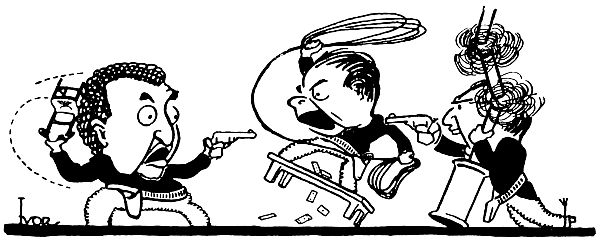
1 Brade climbing holly-tree to recover lost club. Secretary demurs. It is pointed out that this is exhibition play. Something tears. Exhibition expected. It is only braid. Tailor summoned hastily.
2 Fardon’s drive. Fardon the ages now. Its journey well begun. It strikes a toompty. Then rolls on. He holes a five in one.
3 Teeing off the caddy. A spoon shot. A pull. Very hot. A dead stymie. Poor little thing! Humanity prevails. Military honours. Dormy one.
4 Brade haz ’ard luck in a hazard. He digs. “Having no spade, partner?” Bunker replaced by onlookers. Several onlookers replaced in bunker.
5 Casual water. Pulling Fardon out of a well without penalty. One up and the deuce to pay. Brade plays puff-ball in mistake for golf-ball. Bystanders appreciably thinning. Overtaking a foursome. A threesome. Loathesome.
6 The end of the game. Part of the ritual of golf. Panorama of moving figures running off for gin and ginger. The Sunningdale Arms. Arm in arm. Links. Unlinked. “Not stopping this side of Virginia Water.”
Lady Gertrude seated at breakfast table. Eggs, ham, bacon, kidneys, kippers, etc. Lady Gertrude helps herself to all except the last.
Sir Anthony enters late. She glares at him while he seats himself. Butler offers him everything in turn, but each dish is waved away by Lady Gertrude. At last he seizes a kipper on his fork. He takes one bite. It is snatched away by Lady Gertrude and thrown at the cat. He takes a piece of toast, but is unable to secure margarine or marmalade. He breakfasts.
At the front door. Sir Anthony stands waiting. Hunting garb complete, except that he wears black trousers instead of white breeches. A friend arrives on horseback, and indicates, “Coming to the meet in those?” Sir Anthony jerks thumb in direction of Lady Gertrude, and points to his trousers.
Angelina elopes with Edwin. Angelina’s father pursues them, but fails to overtake them until they are married. Angelina’s mother arrives and bursts into tears. A snowstorm. No conveyance available except tandem bicycle with sidecar and trailer. Edwin has hired this, and proposes to start directly after lunch. Angelina’s father and mother implore. Edwin declines. Angelina is neutral.
Finding, however, that trailer is certain to get unfastened by vibration, and that no one can possibly remain seated in sidecar, Edwin agrees to take passengers. They start. Trailer slips off backwards down long hill. Sidecar falls over precipice.
Edwin and Angelina reach their destination, but find that old birds are missing. Angelina suggests half-heartedly that Edwin should go back and search. Edwin declines. They enter hotel, and live happily ever afterwards.
Percy, the millionaire’s son and heir. He falls in love with Rebecca, daughter of a multi-millionaire. Percy’s father had once been in love with Rebecca’s mother. Percy’s mother had several times been in love with Rebecca’s father. Nobody knew this except the Press.
Percy tells his father of his love-affair. Father is furious. He sends for his lawyer, his will, his banker, and his tobacconist. He tells Percy that if he marries Rebecca, all his money shall go to the Home for Diseased and Incurable Kimonos. Percy asks to be allowed to think it over.
Percy tells Rebecca. Her father declares that when she marries Percy he will give him as a wedding present twenty million dollars. Percy thinks it over. He goes to his father. He makes the grand refusal. “Father, I love her. I will pay your price.” His father accordingly alters his will.
How it is done. Making the patient red. Making him cross. The Hospital Orderly. His tenderness. How he treats All My Comrades. Dosing the troops with P.U.O. Surgical instruments being shipped for Hari-Kari. View of Hari-Kari. Interiors.
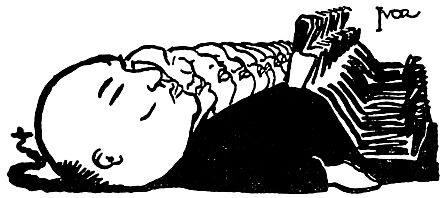
How they grow. The Colonel. His chestnuts. Mrs. Colonel, a hard knut to crack. Company Officer shelling out deferred pay nuts. Other species. Conquerors. Winning the war. Piling up ammunition. Monkeying with shells. The Serjeant-major’s aunt Sally. A shy one. Cokernuts. Or cigars.
The Waacs’ work. Madame Tussaud. Sealing Waacs. Disciplinary action, or whacking the Waac. Toilet waccessories. The honey-comb. Honeymoons. German bees distributing honey. German shells distributing Waacs. The Waacs asleep. Peace at last.
The Red Triangle. Making the note-paper. Giving it to the troops. “You had a sheet last week.” Making the tea. Tracking the tea-leaf. Searching for sugar. Needing the Nestlé. The piano at work. Ditto in play. In off the red triangle. The motto: “Closed.”
The Chinese G.O.C.-in-C., General Meno Savvy. Some of his wives. His pig-tail. His blandness. Chinese sports. An opium den. Faro. Moses. Pulling the Walthamstow. Epping the Zeppelin. Throwing the Leytonstone.
Coming through the Rye. Regimental March, “Robin Adair.” In Birdcage Walk. Drinking Canary seed. The wings of a squadron. Fluffy. Egging her on. The Nestlé season. Shutting down hatches. Getting the bird.
Picking the buds. A blooming swindle. The smell of the ocean. The smell of Salonika. Catching it hot,[69] Bouquet de Bulgarie. Ottoman olfactives working at a hose. Atta rose. Johann Maria inventing a highly sensitive nose. The lily of the Val de Travers. Fishing for Frangipanni. Back petalling. The Eau B.E.
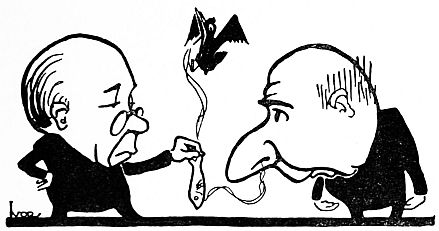
Sighting land. Landing sites. Achi Baba. A close shave. A brush with the machine guns. Napoo. Shampoo. Epsom salts. Up the straits. Round Tattenham Corner. Lighting the K Lighters. Fighting the B Lighters. Turks trotting. Bulgars bulging. Armenians with harmoniums. Cossacks in cassocks. Giving ’em Dardanell.
Ananias and Sapphira Munchausen plotting to become great explorers. Ananias determines to discover the North Pole. Sapphira insists on finding the South Seas. They finally decide to fit out two expeditions, and to communicate by wireless telephony.
Ananias buys his outfit. He is thin, but when clothed, entire staff cannot get him through doorway. Sleighs. Icepicks. Toothpicks. Thermos flasks. Electric radiators. “Label everything Munchausen, and send to my hotel.” Ten pantechnicons convey the goods to hotel.
Sapphira buys her outfit. Five hundred sh! A thousand you know whats. Other garments in proportion. She is much thinner when garbed for her expedition, but chases shop-walker for suggesting a dripping-pan. Ice-cream machines. Hammocks. Palanquins. Canoes. “Label everything Munchausen, and send to my hotel.” Twenty-seven pantechnicons convey the goods to hotel.
Street blocked. Hotel refuses to accept delivery. The Munchausens arrive. Goods dumped in doorway. People in hotel cannot get out. Mountaineering parties arranged. One party falls in road, and is run over by traction engine. Other parties entangled in ropes of yet other parties. Lucky blow of ice-pick catches Sapphira in rear.
The start. One small boy on otherwise deserted quay listens to speeches from the two different boats.
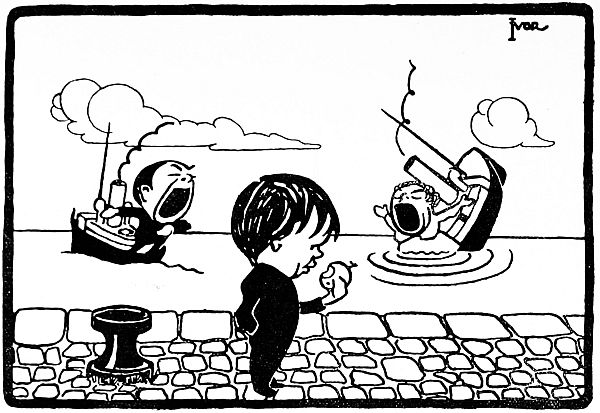
Beautiful scenery near North Pole. Ananias unpacks. Large quantities of ladies’ light summer clothing. Puts all on, in a rage, and appears on deck. Captain puts him in irons.
Beautiful scenery in South Seas. Sapphira unpacks. Large quantities of Arctic garments. Puts them on, raging, and cannot turn round in cabin. Is hauled on deck by steam crane through skylight. Captain puts her in irons.
Both explorers suddenly remember wireless telephone. Air fuses all along the line. Both ships catch fire. Arrival at port. Boats meeting. Ananias finds affinity and tells the tale. Sapphira finds affinity and tells the tale.
As the boats pass they see one another. Sapphira falls on her affinity’s neck. Breaks it. With one scornful glance she throws herself into the sea, swamping a liner with the wash.
Ananias cries out in astonishment, “My wife!” He is thereupon knocked overboard by his affinity. He is washed on to a high cliff by his wife’s wash. Sapphira tries to follow. Causes a landslide. They roll in each other’s arms to the beach. The boats steam away, while passengers throw everything portable at them and fire at them with syphons and signal guns. Both are left lying.
NEXT WEEK.
ANANIAS AND SAPPHIRA
IN SPORT.
“Good.”—Athenæum.
“An excellent book for serious thinkers ... showing a thorough grasp of every subject it deals with. What especially pleases us is the absence of all attempt at humour.”—Scotsman.
“Should go far . . . as far as possible.”—Church Times.
“The Areopagitica filled a lacuna in English literature which had not previously been noticed. Milton in his blindness saw what others, better equipped with visual organs, had failed to perceive. What was his reward? Is not his monumental work the text-book for all encyclopædists of the Areopagus? . . . But it is a trifle heavy. Even Q. H. Flaccus opined that it was dulce to desipere in loco. Sometimes one feels the need of a lighter work, which makes a less severe tax on the cerebellular tissue. This is it.”—Daily Telegraph.
“Rotten.”—G. S. B. in Extenso.
“Teachers will welcome this volume, as it proves clearly how superfluous is the didactician.”—Schoolmaster.
“These scribblers just have got it in once. It eats. They are some shakes.”—American Review.
“Receiving orders daily.”—Stubbs’ Gazette.
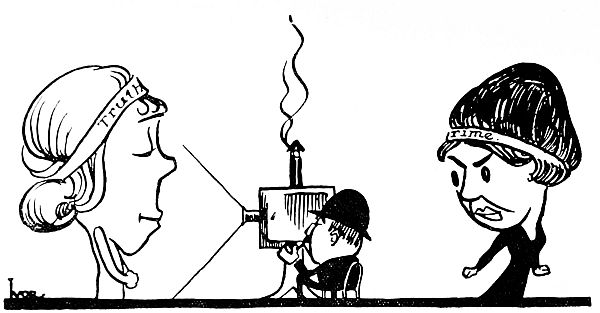
Messrs. Carpe and Diem respectfully spring the following list of spring publications.
“Bow-wow.” By Colley (a posthumous work).
“Charred Embers, or My Excursion to the Other World.” By Donum Boyle.
“The Deacon’s Arch.” By N. Evil Feminine.
“The Great Strike.” By the popular author of “The Fight that Failed.”
“Mutual Trust: A Discussion on the ethical and historical Effects of the Interchange of Hats between Bishops and leading Nonconformists.” By Professor Keating, LL.D.
“The Modern Man’s Bible.” Buyer and Muttonley. A ruthless excision of all dogmatic texts, their places being filled by extracts from “Tom Bull.”
“Russia, or The Prophet Here.” By Fortuna Waugh. A new venture in cheap fiction, published on thin paper suitable for shaving purposes. Price 42s. net.
“Did he?” By Jove.
“Foxe’s Book of Tomatoes.” Revised and authoritative edition.
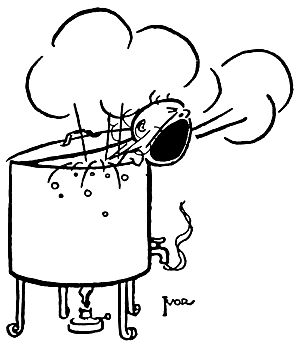
The Melticooker
| Breakfast, Lunch, Tea, Dinner, Supper, and Accounts, all cooked at once. It Just Won’t Bath Baby. |
If you are landed in the soup
see that it bears our trade-mark.
Popular with politicians.
Send for our Blue-Book.
Tureen, with Life-belt, given away
to every purchaser.
Drills. Drills. Drills.
Drills of all kinds.
Squad drills, hair drills,
Pack drills, square drills,
Tendrils, spandrils.
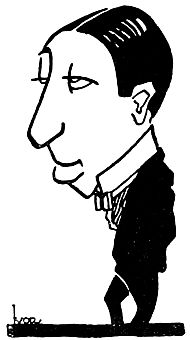
£5,000 a year
|
Write to us for Free Prospectus. No security. We show great interest. Absolute secrecy. Even your left hand will not know what your note of hand commits you to. Moss and Moss, Sheenies Walk, Chelsea. |
It is well known that diseases of various kinds are contracted by frequenting crowded theatres. Try our Scentrifugal Drops and stand alone. Powerful, effective. No one can approach our success. You score three for a clear board. Attendants powerless.
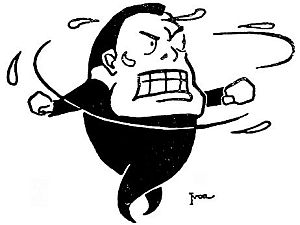
Tin Tanks for Tommies. Discharged Soldiers should write to us for list of model dwellings in corrugated iron. Sent in sections on the instalment system. You pay one shilling and receive one chimney. Your next shilling secures the roof; the next the chicken-run; and so on. A child can erect or dismantle. (Inset, child dismantling at inopportune moment.)
Punctuation errors repaired.
Page 38, “absoletely” changed to “absolutely” (absolutely used up)
End of the Project Gutenberg EBook of The Nurserymatograph, by A Lawyer
*** END OF THIS PROJECT GUTENBERG EBOOK THE NURSERYMATOGRAPH ***
***** This file should be named 46707-h.htm or 46707-h.zip *****
This and all associated files of various formats will be found in:
http://www.gutenberg.org/4/6/7/0/46707/
Produced by Chris Curnow, Emmy and the Online Distributed
Proofreading Team at http://www.pgdp.net (This file was
produced from images generously made available by The
Internet Archive)
Updated editions will replace the previous one--the old editions will
be renamed.
Creating the works from print editions not protected by U.S. copyright
law means that no one owns a United States copyright in these works,
so the Foundation (and you!) can copy and distribute it in the United
States without permission and without paying copyright
royalties. Special rules, set forth in the General Terms of Use part
of this license, apply to copying and distributing Project
Gutenberg-tm electronic works to protect the PROJECT GUTENBERG-tm
concept and trademark. Project Gutenberg is a registered trademark,
and may not be used if you charge for the eBooks, unless you receive
specific permission. If you do not charge anything for copies of this
eBook, complying with the rules is very easy. You may use this eBook
for nearly any purpose such as creation of derivative works, reports,
performances and research. They may be modified and printed and given
away--you may do practically ANYTHING in the United States with eBooks
not protected by U.S. copyright law. Redistribution is subject to the
trademark license, especially commercial redistribution.
START: FULL LICENSE
THE FULL PROJECT GUTENBERG LICENSE
PLEASE READ THIS BEFORE YOU DISTRIBUTE OR USE THIS WORK
To protect the Project Gutenberg-tm mission of promoting the free
distribution of electronic works, by using or distributing this work
(or any other work associated in any way with the phrase "Project
Gutenberg"), you agree to comply with all the terms of the Full
Project Gutenberg-tm License available with this file or online at
www.gutenberg.org/license.
Section 1. General Terms of Use and Redistributing Project
Gutenberg-tm electronic works
1.A. By reading or using any part of this Project Gutenberg-tm
electronic work, you indicate that you have read, understand, agree to
and accept all the terms of this license and intellectual property
(trademark/copyright) agreement. If you do not agree to abide by all
the terms of this agreement, you must cease using and return or
destroy all copies of Project Gutenberg-tm electronic works in your
possession. If you paid a fee for obtaining a copy of or access to a
Project Gutenberg-tm electronic work and you do not agree to be bound
by the terms of this agreement, you may obtain a refund from the
person or entity to whom you paid the fee as set forth in paragraph
1.E.8.
1.B. "Project Gutenberg" is a registered trademark. It may only be
used on or associated in any way with an electronic work by people who
agree to be bound by the terms of this agreement. There are a few
things that you can do with most Project Gutenberg-tm electronic works
even without complying with the full terms of this agreement. See
paragraph 1.C below. There are a lot of things you can do with Project
Gutenberg-tm electronic works if you follow the terms of this
agreement and help preserve free future access to Project Gutenberg-tm
electronic works. See paragraph 1.E below.
1.C. The Project Gutenberg Literary Archive Foundation ("the
Foundation" or PGLAF), owns a compilation copyright in the collection
of Project Gutenberg-tm electronic works. Nearly all the individual
works in the collection are in the public domain in the United
States. If an individual work is unprotected by copyright law in the
United States and you are located in the United States, we do not
claim a right to prevent you from copying, distributing, performing,
displaying or creating derivative works based on the work as long as
all references to Project Gutenberg are removed. Of course, we hope
that you will support the Project Gutenberg-tm mission of promoting
free access to electronic works by freely sharing Project Gutenberg-tm
works in compliance with the terms of this agreement for keeping the
Project Gutenberg-tm name associated with the work. You can easily
comply with the terms of this agreement by keeping this work in the
same format with its attached full Project Gutenberg-tm License when
you share it without charge with others.
1.D. The copyright laws of the place where you are located also govern
what you can do with this work. Copyright laws in most countries are
in a constant state of change. If you are outside the United States,
check the laws of your country in addition to the terms of this
agreement before downloading, copying, displaying, performing,
distributing or creating derivative works based on this work or any
other Project Gutenberg-tm work. The Foundation makes no
representations concerning the copyright status of any work in any
country outside the United States.
1.E. Unless you have removed all references to Project Gutenberg:
1.E.1. The following sentence, with active links to, or other
immediate access to, the full Project Gutenberg-tm License must appear
prominently whenever any copy of a Project Gutenberg-tm work (any work
on which the phrase "Project Gutenberg" appears, or with which the
phrase "Project Gutenberg" is associated) is accessed, displayed,
performed, viewed, copied or distributed:
This eBook is for the use of anyone anywhere in the United States and
most other parts of the world at no cost and with almost no
restrictions whatsoever. You may copy it, give it away or re-use it
under the terms of the Project Gutenberg License included with this
eBook or online at www.gutenberg.org. If you are not located in the
United States, you'll have to check the laws of the country where you
are located before using this ebook.
1.E.2. If an individual Project Gutenberg-tm electronic work is
derived from texts not protected by U.S. copyright law (does not
contain a notice indicating that it is posted with permission of the
copyright holder), the work can be copied and distributed to anyone in
the United States without paying any fees or charges. If you are
redistributing or providing access to a work with the phrase "Project
Gutenberg" associated with or appearing on the work, you must comply
either with the requirements of paragraphs 1.E.1 through 1.E.7 or
obtain permission for the use of the work and the Project Gutenberg-tm
trademark as set forth in paragraphs 1.E.8 or 1.E.9.
1.E.3. If an individual Project Gutenberg-tm electronic work is posted
with the permission of the copyright holder, your use and distribution
must comply with both paragraphs 1.E.1 through 1.E.7 and any
additional terms imposed by the copyright holder. Additional terms
will be linked to the Project Gutenberg-tm License for all works
posted with the permission of the copyright holder found at the
beginning of this work.
1.E.4. Do not unlink or detach or remove the full Project Gutenberg-tm
License terms from this work, or any files containing a part of this
work or any other work associated with Project Gutenberg-tm.
1.E.5. Do not copy, display, perform, distribute or redistribute this
electronic work, or any part of this electronic work, without
prominently displaying the sentence set forth in paragraph 1.E.1 with
active links or immediate access to the full terms of the Project
Gutenberg-tm License.
1.E.6. You may convert to and distribute this work in any binary,
compressed, marked up, nonproprietary or proprietary form, including
any word processing or hypertext form. However, if you provide access
to or distribute copies of a Project Gutenberg-tm work in a format
other than "Plain Vanilla ASCII" or other format used in the official
version posted on the official Project Gutenberg-tm web site
(www.gutenberg.org), you must, at no additional cost, fee or expense
to the user, provide a copy, a means of exporting a copy, or a means
of obtaining a copy upon request, of the work in its original "Plain
Vanilla ASCII" or other form. Any alternate format must include the
full Project Gutenberg-tm License as specified in paragraph 1.E.1.
1.E.7. Do not charge a fee for access to, viewing, displaying,
performing, copying or distributing any Project Gutenberg-tm works
unless you comply with paragraph 1.E.8 or 1.E.9.
1.E.8. You may charge a reasonable fee for copies of or providing
access to or distributing Project Gutenberg-tm electronic works
provided that
* You pay a royalty fee of 20% of the gross profits you derive from
the use of Project Gutenberg-tm works calculated using the method
you already use to calculate your applicable taxes. The fee is owed
to the owner of the Project Gutenberg-tm trademark, but he has
agreed to donate royalties under this paragraph to the Project
Gutenberg Literary Archive Foundation. Royalty payments must be paid
within 60 days following each date on which you prepare (or are
legally required to prepare) your periodic tax returns. Royalty
payments should be clearly marked as such and sent to the Project
Gutenberg Literary Archive Foundation at the address specified in
Section 4, "Information about donations to the Project Gutenberg
Literary Archive Foundation."
* You provide a full refund of any money paid by a user who notifies
you in writing (or by e-mail) within 30 days of receipt that s/he
does not agree to the terms of the full Project Gutenberg-tm
License. You must require such a user to return or destroy all
copies of the works possessed in a physical medium and discontinue
all use of and all access to other copies of Project Gutenberg-tm
works.
* You provide, in accordance with paragraph 1.F.3, a full refund of
any money paid for a work or a replacement copy, if a defect in the
electronic work is discovered and reported to you within 90 days of
receipt of the work.
* You comply with all other terms of this agreement for free
distribution of Project Gutenberg-tm works.
1.E.9. If you wish to charge a fee or distribute a Project
Gutenberg-tm electronic work or group of works on different terms than
are set forth in this agreement, you must obtain permission in writing
from both the Project Gutenberg Literary Archive Foundation and The
Project Gutenberg Trademark LLC, the owner of the Project Gutenberg-tm
trademark. Contact the Foundation as set forth in Section 3 below.
1.F.
1.F.1. Project Gutenberg volunteers and employees expend considerable
effort to identify, do copyright research on, transcribe and proofread
works not protected by U.S. copyright law in creating the Project
Gutenberg-tm collection. Despite these efforts, Project Gutenberg-tm
electronic works, and the medium on which they may be stored, may
contain "Defects," such as, but not limited to, incomplete, inaccurate
or corrupt data, transcription errors, a copyright or other
intellectual property infringement, a defective or damaged disk or
other medium, a computer virus, or computer codes that damage or
cannot be read by your equipment.
1.F.2. LIMITED WARRANTY, DISCLAIMER OF DAMAGES - Except for the "Right
of Replacement or Refund" described in paragraph 1.F.3, the Project
Gutenberg Literary Archive Foundation, the owner of the Project
Gutenberg-tm trademark, and any other party distributing a Project
Gutenberg-tm electronic work under this agreement, disclaim all
liability to you for damages, costs and expenses, including legal
fees. YOU AGREE THAT YOU HAVE NO REMEDIES FOR NEGLIGENCE, STRICT
LIABILITY, BREACH OF WARRANTY OR BREACH OF CONTRACT EXCEPT THOSE
PROVIDED IN PARAGRAPH 1.F.3. YOU AGREE THAT THE FOUNDATION, THE
TRADEMARK OWNER, AND ANY DISTRIBUTOR UNDER THIS AGREEMENT WILL NOT BE
LIABLE TO YOU FOR ACTUAL, DIRECT, INDIRECT, CONSEQUENTIAL, PUNITIVE OR
INCIDENTAL DAMAGES EVEN IF YOU GIVE NOTICE OF THE POSSIBILITY OF SUCH
DAMAGE.
1.F.3. LIMITED RIGHT OF REPLACEMENT OR REFUND - If you discover a
defect in this electronic work within 90 days of receiving it, you can
receive a refund of the money (if any) you paid for it by sending a
written explanation to the person you received the work from. If you
received the work on a physical medium, you must return the medium
with your written explanation. The person or entity that provided you
with the defective work may elect to provide a replacement copy in
lieu of a refund. If you received the work electronically, the person
or entity providing it to you may choose to give you a second
opportunity to receive the work electronically in lieu of a refund. If
the second copy is also defective, you may demand a refund in writing
without further opportunities to fix the problem.
1.F.4. Except for the limited right of replacement or refund set forth
in paragraph 1.F.3, this work is provided to you 'AS-IS', WITH NO
OTHER WARRANTIES OF ANY KIND, EXPRESS OR IMPLIED, INCLUDING BUT NOT
LIMITED TO WARRANTIES OF MERCHANTABILITY OR FITNESS FOR ANY PURPOSE.
1.F.5. Some states do not allow disclaimers of certain implied
warranties or the exclusion or limitation of certain types of
damages. If any disclaimer or limitation set forth in this agreement
violates the law of the state applicable to this agreement, the
agreement shall be interpreted to make the maximum disclaimer or
limitation permitted by the applicable state law. The invalidity or
unenforceability of any provision of this agreement shall not void the
remaining provisions.
1.F.6. INDEMNITY - You agree to indemnify and hold the Foundation, the
trademark owner, any agent or employee of the Foundation, anyone
providing copies of Project Gutenberg-tm electronic works in
accordance with this agreement, and any volunteers associated with the
production, promotion and distribution of Project Gutenberg-tm
electronic works, harmless from all liability, costs and expenses,
including legal fees, that arise directly or indirectly from any of
the following which you do or cause to occur: (a) distribution of this
or any Project Gutenberg-tm work, (b) alteration, modification, or
additions or deletions to any Project Gutenberg-tm work, and (c) any
Defect you cause.
Section 2. Information about the Mission of Project Gutenberg-tm
Project Gutenberg-tm is synonymous with the free distribution of
electronic works in formats readable by the widest variety of
computers including obsolete, old, middle-aged and new computers. It
exists because of the efforts of hundreds of volunteers and donations
from people in all walks of life.
Volunteers and financial support to provide volunteers with the
assistance they need are critical to reaching Project Gutenberg-tm's
goals and ensuring that the Project Gutenberg-tm collection will
remain freely available for generations to come. In 2001, the Project
Gutenberg Literary Archive Foundation was created to provide a secure
and permanent future for Project Gutenberg-tm and future
generations. To learn more about the Project Gutenberg Literary
Archive Foundation and how your efforts and donations can help, see
Sections 3 and 4 and the Foundation information page at
www.gutenberg.org Section 3. Information about the Project Gutenberg
Literary Archive Foundation
The Project Gutenberg Literary Archive Foundation is a non profit
501(c)(3) educational corporation organized under the laws of the
state of Mississippi and granted tax exempt status by the Internal
Revenue Service. The Foundation's EIN or federal tax identification
number is 64-6221541. Contributions to the Project Gutenberg Literary
Archive Foundation are tax deductible to the full extent permitted by
U.S. federal laws and your state's laws.
The Foundation's principal office is in Fairbanks, Alaska, with the
mailing address: PO Box 750175, Fairbanks, AK 99775, but its
volunteers and employees are scattered throughout numerous
locations. Its business office is located at 809 North 1500 West, Salt
Lake City, UT 84116, (801) 596-1887. Email contact links and up to
date contact information can be found at the Foundation's web site and
official page at www.gutenberg.org/contact
For additional contact information:
Dr. Gregory B. Newby
Chief Executive and Director
[email protected]
Section 4. Information about Donations to the Project Gutenberg
Literary Archive Foundation
Project Gutenberg-tm depends upon and cannot survive without wide
spread public support and donations to carry out its mission of
increasing the number of public domain and licensed works that can be
freely distributed in machine readable form accessible by the widest
array of equipment including outdated equipment. Many small donations
($1 to $5,000) are particularly important to maintaining tax exempt
status with the IRS.
The Foundation is committed to complying with the laws regulating
charities and charitable donations in all 50 states of the United
States. Compliance requirements are not uniform and it takes a
considerable effort, much paperwork and many fees to meet and keep up
with these requirements. We do not solicit donations in locations
where we have not received written confirmation of compliance. To SEND
DONATIONS or determine the status of compliance for any particular
state visit www.gutenberg.org/donate
While we cannot and do not solicit contributions from states where we
have not met the solicitation requirements, we know of no prohibition
against accepting unsolicited donations from donors in such states who
approach us with offers to donate.
International donations are gratefully accepted, but we cannot make
any statements concerning tax treatment of donations received from
outside the United States. U.S. laws alone swamp our small staff.
Please check the Project Gutenberg Web pages for current donation
methods and addresses. Donations are accepted in a number of other
ways including checks, online payments and credit card donations. To
donate, please visit: www.gutenberg.org/donate
Section 5. General Information About Project Gutenberg-tm electronic works.
Professor Michael S. Hart was the originator of the Project
Gutenberg-tm concept of a library of electronic works that could be
freely shared with anyone. For forty years, he produced and
distributed Project Gutenberg-tm eBooks with only a loose network of
volunteer support.
Project Gutenberg-tm eBooks are often created from several printed
editions, all of which are confirmed as not protected by copyright in
the U.S. unless a copyright notice is included. Thus, we do not
necessarily keep eBooks in compliance with any particular paper
edition.
Most people start at our Web site which has the main PG search
facility: www.gutenberg.org
This Web site includes information about Project Gutenberg-tm,
including how to make donations to the Project Gutenberg Literary
Archive Foundation, how to help produce our new eBooks, and how to
subscribe to our email newsletter to hear about new eBooks.